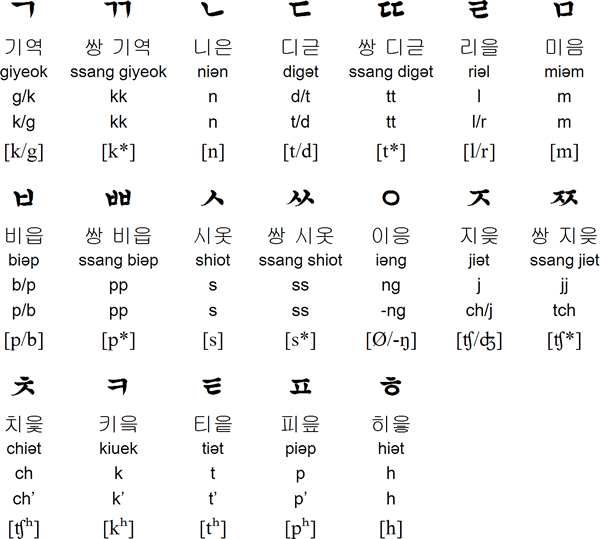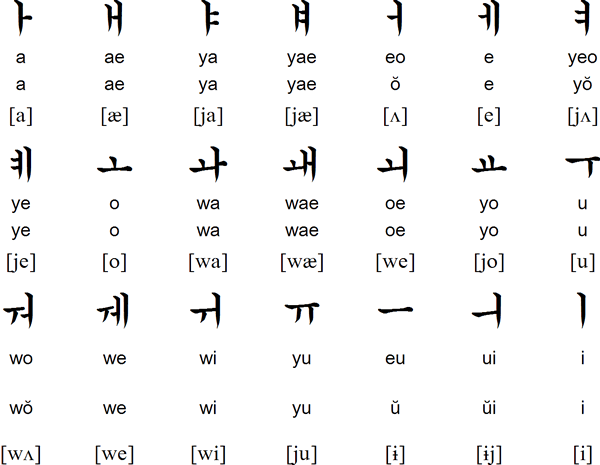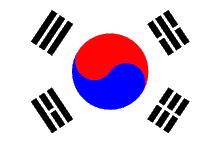있다
=
to exist
it da
♥¸¸.•*¨*•♫♪♪♫•*¨*•.¸¸♥¸¸.•*¨*•♫♪♪♫•*¨*•.¸¸♥
Sentence: Korea is located in Asia.
한국han gook
은woon
아시아a si a
에e
있it
습soop
니다ni da
.
한국han gook
Korea
은woon
(particle after subject or object word)
아시아a si a
Asia
에e
at, to (particle after place, time or object)
있it
Infinitive: 있다
it da
to exist 습soop
(particle in verb to add politeness, formal)
니다ni da
(particle after verb to complete sentence, polite tone)
한국
han gook
South Korea
은
woon
1. (particle after subject or object word) 2. (particle to make adjective) 3. (particle to add emphasis) 4. (particle between verb and relative pronoun) 5. silver (metal)
아
a si a
Asia
에
e
1. at, to, by, on, in (particle after place, time or object) 2. because of (particle after noun or gerund to add reason) 3. for (particle after noun or gerund to add 'purpose')
있다
it da
to exist
습
soop
(particle in verb to add politeness, formal)
니다
ni da
(particle after verb to complete sentence, polite tone)
Sentence: Korea is located in Asia.
한국han gook
은woon
아시아a si a
에e
있it
습soop
니다ni da
.
한국han gook
Korea
은woon
(particle after subject or object word)
아시아a si a
Asia
에e
at, to (particle after place, time or object)
있it
Infinitive: 있다
it da
to exist 습soop
(particle in verb to add politeness, formal)
니다ni da
(particle after verb to complete sentence, polite tone)
♥¸¸.•*¨*•♫♪ ♪♫•*¨*•.¸¸♥¸¸.•*¨*•♫♪♪♫•*¨*•.¸¸♥
Sentence: Can you speak English?
영어yung uh
하ha
실sil
수soo
있어i suh
요yo
?
영어yung uh
English language
하ha
Infinitive: 하다
ha da
to do 실sil
Infinitive: 시
si
(particle in verb to add politeness) 수soo
(particle after verb to add meaning of possibility)
있어i suh
Infinitive: 있다
it da
to exist 요yo
(particle after verb to make semi-polite question)
영어
yung uh
English language
하다
ha da
1. to do 2. to be (+ adjective or noun to describe something) 3. to have to, must
시
si
1. hour, time, o'clock 2. (particle in verb to add politeness) 3. (particle in verb to make polite request) 4. city, town 5. (particle in noun to add meaning of 'in-law')
수
soo
1. (particle after verb to add meaning of possibility) 2. number, numerous 3. water
있다
it da
to exist
요
yo
1. (particle after verb to make semi-polite question) 2. (particle after verb to finish sentence in semi-polite tone)
Sentence: Can you speak English?
영어yung uh
하ha
실sil
수soo
있어i suh
요yo
?
영어yung uh
English language
하ha
Infinitive: 하다
ha da
to do 실sil
Infinitive: 시
si
(particle in verb to add politeness) 수soo
(particle after verb to add meaning of possibility)
있어i suh
Infinitive: 있다
it da
to exist 요yo
(particle after verb to make semi-polite question)
♥¸¸.•*¨*•♫♪ ♪♫•*¨*•.¸¸♥¸¸.•*¨*•♫♪♪♫•*¨*•.¸¸♥
Sentence: Enjoy your food!
맛mat
있it
게ge
드doo
세se
요yo
!
맛mat
taste, flavour
있it
Infinitive: 있다
it da
to exist 게ge
(particle after verb or adjective to make adverb)
드doo
Infinitive: 들다
dool da
to eat 세se
Infinitive: 시
si
(particle in verb to make polite request) 요yo
(particle after verb to finish sentence in semi-polite tone)
맛
mat
taste, flavour
있다
it da
to exist
게
ge
1. (particle after verb or adjective to make adverb) 2. (particle after 'person' to add meaning of 'to', 'towards') 3. crab 4. (short form of gerund '~ing' or something + particle for subject or object word)
들다
dool da
1. to lift, to carry, to raise 2. to eat 3. to age 4. to cost 5. to enter, to go in
시
si
1. hour, time, o'clock 2. (particle in verb to add politeness) 3. (particle in verb to make polite request) 4. city, town 5. (particle in noun to add meaning of 'in-law')
요
yo
1. (particle after verb to make semi-polite question) 2. (particle after verb to finish sentence in semi-polite tone)
Sentence: Enjoy your food!
맛mat
있it
게ge
드doo
세se
요yo
!
맛mat
taste, flavour
있it
Infinitive: 있다
it da
to exist 게ge
(particle after verb or adjective to make adverb)
드doo
Infinitive: 들다
dool da
to eat 세se
Infinitive: 시
si
(particle in verb to make polite request) 요yo
(particle after verb to finish sentence in semi-polite tone)
♥¸¸.•*¨*•♫♪ ♪♫•*¨*•.¸¸♥¸¸.•*¨*•♫♪♪♫•*¨*•.¸¸♥
Sentence: Did you like the food?
음식woom sik
이i
맛mat
있it
었ut
어요uh yo
?
음식woom sik
food
이i
(particle after subject or object word)
맛mat
taste, flavour
있it
Infinitive: 있다
it da
to exist 었ut
(particle in verb to add meaning of past, 'used to')
어요uh yo
Infinitive: 요
yo
(particle after verb to make semi-polite question)
음식
woom sik
food
이
i
1. (particle after subject or object word) 2. this 3. (particle after verb or adjective to make adverb) 4. tooth, teeth 5. two, 2 6. lice (insect) 7. person (particle after younger/same age person's name)
맛
mat
taste, flavour
있다
it da
to exist
었
ut
(particle in verb to add meaning of past, 'used to')
요
yo
1. (particle after verb to make semi-polite question) 2. (particle after verb to finish sentence in semi-polite tone)
Sentence: Did you like the food?
음식woom sik
이i
맛mat
있it
었ut
어요uh yo
?
음식woom sik
food
이i
(particle after subject or object word)
맛mat
taste, flavour
있it
Infinitive: 있다
it da
to exist 었ut
(particle in verb to add meaning of past, 'used to')
어요uh yo
Infinitive: 요
yo
(particle after verb to make semi-polite question)
♥¸¸.•*¨*•♫♪ ♪♫•*¨*•.¸¸♥¸¸.•*¨*•♫♪♪♫•*¨*•.¸¸♥
Sentence: What conclusion can we draw from this?
여기yuh gi
서suh
어떤uh tun
결론gyul ron
을wool
내릴ne ril
수soo
있it
겠get
습soop
니까ni ka
?
여기yuh gi
here
서suh
Infinitive: 에서
e suh
at, from (particle after place or time) 어떤uh tun
what, which, how, who (+ body or thing)
결론gyul ron
conclusion
을wool
(particle after object word)
내릴ne ril
Infinitive: 내리다
ne ri da
to bring down, to take down, to get down 수soo
(particle after verb to add meaning of possibility)
있it
Infinitive: 있다
it da
to exist 겠get
(particle in verb to add meaning of 'likely')
습soop
(particle in verb to add politeness, formal)
니까ni ka
Infinitive: 까
ka
(particle after verb to make polite question)
여기
yuh gi
here
에서
e suh
at, from (particle after place or time)
어떤
uh tun
1. what, which, how, who (+ body or thing) 2. some, any
결론
gyul ron
conclusion
을
wool
1. (particle after object word) 2. (particle in verb to add meaning of 'perhaps')
내리다
ne ri da
to bring down, to take down, to get down
수
soo
1. (particle after verb to add meaning of possibility) 2. number, numerous 3. water
있다
it da
to exist
겠
get
1. (particle in verb to add meaning of 'likely') 2. (particle in verb to add meaning of future tense, 'will', 'shall')
습
soop
(particle in verb to add politeness, formal)
까
ka
1. (particle after verb to make polite question) 2. (particle in verb to add meaning of 'shall', 'will')
Sentence: What conclusion can we draw from this?
여기yuh gi
서suh
어떤uh tun
결론gyul ron
을wool
내릴ne ril
수soo
있it
겠get
습soop
니까ni ka
?
여기yuh gi
here
서suh
Infinitive: 에서
e suh
at, from (particle after place or time) 어떤uh tun
what, which, how, who (+ body or thing)
결론gyul ron
conclusion
을wool
(particle after object word)
내릴ne ril
Infinitive: 내리다
ne ri da
to bring down, to take down, to get down 수soo
(particle after verb to add meaning of possibility)
있it
Infinitive: 있다
it da
to exist 겠get
(particle in verb to add meaning of 'likely')
습soop
(particle in verb to add politeness, formal)
니까ni ka
Infinitive: 까
ka
(particle after verb to make polite question)
♥¸¸.•*¨*•♫♪ ♪♫•*¨*•.¸¸♥¸¸.•*¨*•♫♪♪♫•*¨*•.¸¸♥
Sentence: Everyone is entitled to their own opinion.
누구noo goo
나na
자신ja sin
의ui
견해gyun he
를rool
가질ga jil
권리gyun ri
가ga
있it
습soop
니다ni da
.
누구noo goo
who, somebody, anybody, nobody
나na
(particle after noun to add meaning of 'as well', 'too')
자신ja sin
oneself
의ui
(particle after noun to make possessive, 'of')
견해gyun he
opinion, point of view
를rool
Infinitive: 을
wool
(particle after object word) 가질ga jil
Infinitive: 가지다
ga ji da
to have 권리gyun ri
right, title
가ga
(particle after subject or object word)
있it
Infinitive: 있다
it da
to exist 습soop
(particle in verb to add politeness, formal)
니다ni da
(particle after verb to complete sentence, polite tone)
누구
noo goo
who, somebody, anybody, nobody
나
na
1. I, me (casual) 2. (particle after word to add meaning of 'however') 3. (particle after noun to add meaning of 'as well', 'too') 4. (particle after word to add meaning of 'so much') 5. or 6. (particle after verb or adjective to make question, casual)
자신
ja sin
1. oneself 2. confidence
의
ui
(particle after noun to make possessive, 'of')
견해
gyun he
opinion, point of view
을
wool
1. (particle after object word) 2. (particle in verb to add meaning of 'perhaps')
가지다
ga ji da
to have
권리
gyun ri
right, title
가
ga
1. (particle after subject or object word) 2. edge, rim 3. person, man 4. family 5. (particle after word to add emphasis) 6. if ~ or not
있다
it da
to exist
습
soop
(particle in verb to add politeness, formal)
니다
ni da
(particle after verb to complete sentence, polite tone)
Sentence: Everyone is entitled to their own opinion.
누구noo goo
나na
자신ja sin
의ui
견해gyun he
를rool
가질ga jil
권리gyun ri
가ga
있it
습soop
니다ni da
.
누구noo goo
who, somebody, anybody, nobody
나na
(particle after noun to add meaning of 'as well', 'too')
자신ja sin
oneself
의ui
(particle after noun to make possessive, 'of')
견해gyun he
opinion, point of view
를rool
Infinitive: 을
wool
(particle after object word) 가질ga jil
Infinitive: 가지다
ga ji da
to have 권리gyun ri
right, title
가ga
(particle after subject or object word)
있it
Infinitive: 있다
it da
to exist 습soop
(particle in verb to add politeness, formal)
니다ni da
(particle after verb to complete sentence, polite tone)
♥¸¸.•*¨*•♫♪ ♪♫•*¨*•.¸¸♥¸¸.•*¨*•♫♪♪♫•*¨*•.¸¸♥
Sentence: One can get used to anything.
사람sa ram
은woon
무엇moo ut
에e
든doon
적응juk woong
할hal
수soo
있it
어요uh yo
.
사람sa ram
person, human
은woon
(particle after subject or object word)
무엇moo ut
what, what kind of
에e
at, to (particle after place, time or object)
든doon
(particle after word to add meaning of 'whatever', 'whichever')
적응juk woong
adaptation
할hal
Infinitive: 하다
ha da
to do 수soo
(particle after verb to add meaning of possibility)
있it
Infinitive: 있다
it da
to exist 어요uh yo
Infinitive: 요
yo
(particle after verb to finish sentence in semi-polite tone)
사람
sa ram
person, human
은
woon
1. (particle after subject or object word) 2. (particle to make adjective) 3. (particle to add emphasis) 4. (particle between verb and relative pronoun) 5. silver (metal)
무엇
moo ut
what, what kind of
에
e
1. at, to, by, on, in (particle after place, time or object) 2. because of (particle after noun or gerund to add reason) 3. for (particle after noun or gerund to add 'purpose')
든
doon
1. (particle after word to add meaning of 'whatever', 'whichever') 2. (particle after word to add meaning of 'although', 'even though')
적응
juk woong
adaptation
하다
ha da
1. to do 2. to be (+ adjective or noun to describe something) 3. to have to, must
수
soo
1. (particle after verb to add meaning of possibility) 2. number, numerous 3. water
있다
it da
to exist
요
yo
1. (particle after verb to make semi-polite question) 2. (particle after verb to finish sentence in semi-polite tone)
Sentence: One can get used to anything.
사람sa ram
은woon
무엇moo ut
에e
든doon
적응juk woong
할hal
수soo
있it
어요uh yo
.
사람sa ram
person, human
은woon
(particle after subject or object word)
무엇moo ut
what, what kind of
에e
at, to (particle after place, time or object)
든doon
(particle after word to add meaning of 'whatever', 'whichever')
적응juk woong
adaptation
할hal
Infinitive: 하다
ha da
to do 수soo
(particle after verb to add meaning of possibility)
있it
Infinitive: 있다
it da
to exist 어요uh yo
Infinitive: 요
yo
(particle after verb to finish sentence in semi-polite tone)
♥¸¸.•*¨*•♫♪♪♫•*¨*•.¸¸♥¸¸.•*¨*•♫♪♪♫•*¨*•.¸¸♥


 Please take care of yourself = 잘 지내세요.
Please take care of yourself = 잘 지내세요.




No comments:
Post a Comment
Thank you for your comments!